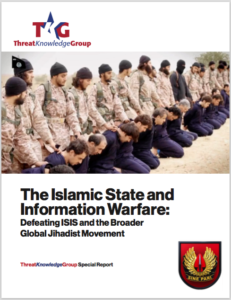Dr. Waller’s paper, “Designing an Information Warfare Campaign Against the Global Jihadi Movement,” was published as part of a report for the John F. Kennedy Special Warfare Center and School, US Army Special Operations Command. The 2014 report was commissioned by the Threat Knowledge Group’s and published in 2015 as a chapter of The Islamic State and Information Warfare: Defeating ISIS and the Broader Global Jihadist Movement.
The summary and introduction appear below.
Summary
The purpose of information warfare is to use information as a weapon of war. The premise of this presentation is that in warfare and political conflict, to inform is to influence. Therefore, the purpose of information warfare is to influence thought processes, beliefs, emotions, and ultimately behavior. We integrate information warfare with psychological operations and raise both to the strategic level for military and other national planning purposes. ARSOF, and USSOCOM in general, are properly situated to be the thought-leaders within the US government for planning the redesign of the behavioral modification element of US strategy against global jihadist threats.
Introduction
Warfare, like politics, is designed to induce an opponent to modify his behavior. Kinetically killing off an opponent’s combatants and destroying his infrastructure and capability are merely means to the end of placing the adversary in a situation in which he cannot or will not continue hostilities.
The United States places great emphasis on the extremely expensive approach of killing the enemy’s combatants and leadership. While destroying combatants and commanders is often necessary, it is not always productive or even possible. Even when it is possible, it can still be counterproductive in the case of highly costly, protracted warfare. Such warfare can have the opposite of its intended effect, strengthening enemy morale and enhancing the attractiveness of its motivational ideology, while demoralizing and fatiguing friends, allies, and even ourselves.
Some of the under-utilized alternative tools—which really should be the military tools of first resort, instead of last resort, as seems to be the case—are what the military calls information warfare and psychological warfare. For civilians, both are components of political warfare: what has been called “the art of heartening friends and disheartening enemies, of gaining help for one’s cause and causing the abandonment of the enemies’ through words and deeds.”
A more useful term for the present fight is the all-inclusive “warfare psychologically waged.” The objective of warfare psychologically waged is NOT necessarily to kill or capture the enemy’s commanders and combatants. The objective is to break their will to be our enemy in the first place. Thus warfare psychologically waged is not an MOS like PSYOP, but a strategic approach to waging war by influencing behavior and breaking enemy will.
Successful warfare requires a defined political victory as the end-state. The United States has enunciated no political end-state for defeating jihadist enemies, either as singular organizations in the cases of al Qaeda or ISIS, or globally as ideological movements. Consequently, the US has not defined a political victory for itself.
Political victory implies a political opponent. The nature of the global jihadist movement has constrained US warfighters and policymakers who treat the movement as a religion instead of as a political force. For our purposes, we define “global jihadist movement” as aggressive and expansionist Islamism, which, though religiously inspired, is fundamentally a political movement seeking political control of populations and territories.
With official US objectives toward global jihadists remaining unclear—whether to de- grade, to defeat, or merely to contain elements of the jihadist movement—it is apparent that there remains no widely accepted or understood strategy. In the case of ISIS, for example, decisionmakers are speaking in terms of maneuver warfare, not ideological warfare, and certainly not about means to break the enemy’s will.
This maneuver warfare approach, by necessity, is time-consuming. By October 2014, senior US officials spoke of recruiting, training and equipping local forces for a “spring offensive” against ISIS in the first half of 2015. That was good news for the enemy. This long lead time was due not only to decision-making delays at the top but to the physical realities of training and logistics on the ground.
Almost inevitably, the military’s information warfare and PSYOP components tend to follow, or at least travel with, the generally long and slow logistical train. If they do serve as part of an advance team, they remain associated with tactical special operations units, and not as lead resources in and of themselves, nor as a core element of strategy. If they are incorporated into a military strategy, they are included as an annex, as if an afterthought, rather than part of the strategic core. This paper recommends a return to warfare psychologically waged, an approach that uses influence as a strategic weapon. This approach places IO/PSYOP at the lead of the fight as instruments to break the enemy’s will and delegitimize and destroy the emotional and intellectual appeal of global jihadist ideology.
For the rest of the chapter, and the complete report, click here: TKG-Report-ISIS-Info-Warfare
